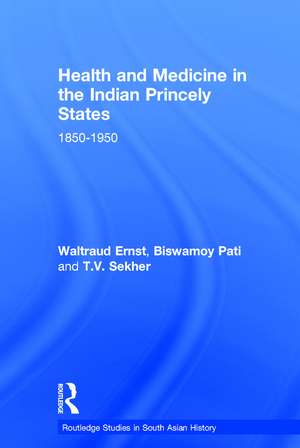Health and Medicine in the Indian Princely States: 1850-1950: Routledge Studies in South Asian History
Autor Waltraud Ernst, Biswamoy Pati, T.V. Sekheren Limba Engleză Hardback – 7 iul 2017
Exploring contentious issues currently debated in the existing scholarship on medicine in British India and other colonies, this book covers the ‘indigenisation’ of health services; the inter-relationship of colonial and indigenous paradigms of medical practice; the impact of specific political and administrative events and changes on health policies. The book also analyses British medical policies and the Indian reactions and initiatives they evoked in different Indian states. It offers new insights into the interplay of local adaptations with global exchanges between different national schools of thought in the formation of what is often vaguely, and all too simply, referred to as 'western' or 'colonial' medicine.
A pioneering study of health and medicine in the princely states of India, it provides a balanced appraisal of the role of medicine during the colonial era. It will be of interest to students and academics studying South Asian and imperial and commonwealth history; the history of medicine; the sociology of health and healing; and medical anthropology, social policy, public health, and international politics.
| Toate formatele și edițiile | Preț | Express |
|---|---|---|
| Paperback (1) | 259.98 lei 6-8 săpt. | |
| Taylor & Francis – 12 dec 2019 | 259.98 lei 6-8 săpt. | |
| Hardback (1) | 763.00 lei 6-8 săpt. | |
| Taylor & Francis – 7 iul 2017 | 763.00 lei 6-8 săpt. |
Din seria Routledge Studies in South Asian History
-
 Preț: 317.08 lei
Preț: 317.08 lei -
 Preț: 318.09 lei
Preț: 318.09 lei -
 Preț: 416.22 lei
Preț: 416.22 lei -
 Preț: 410.66 lei
Preț: 410.66 lei -
 Preț: 380.63 lei
Preț: 380.63 lei -
 Preț: 389.38 lei
Preț: 389.38 lei -
 Preț: 412.57 lei
Preț: 412.57 lei - 19%
 Preț: 258.50 lei
Preț: 258.50 lei -
 Preț: 486.42 lei
Preț: 486.42 lei - 31%
 Preț: 767.20 lei
Preț: 767.20 lei -
 Preț: 412.27 lei
Preț: 412.27 lei -
 Preț: 384.09 lei
Preț: 384.09 lei -
 Preț: 412.57 lei
Preț: 412.57 lei - 12%
 Preț: 299.03 lei
Preț: 299.03 lei - 18%
 Preț: 1055.51 lei
Preț: 1055.51 lei -
 Preț: 405.87 lei
Preț: 405.87 lei - 18%
 Preț: 1057.75 lei
Preț: 1057.75 lei - 18%
 Preț: 1108.37 lei
Preț: 1108.37 lei - 28%
 Preț: 823.44 lei
Preț: 823.44 lei - 20%
 Preț: 259.98 lei
Preț: 259.98 lei -
 Preț: 386.22 lei
Preț: 386.22 lei - 18%
 Preț: 1001.84 lei
Preț: 1001.84 lei - 18%
 Preț: 703.79 lei
Preț: 703.79 lei - 18%
 Preț: 1105.24 lei
Preț: 1105.24 lei -
 Preț: 481.05 lei
Preț: 481.05 lei - 18%
 Preț: 885.83 lei
Preț: 885.83 lei - 18%
 Preț: 996.96 lei
Preț: 996.96 lei - 14%
 Preț: 338.33 lei
Preț: 338.33 lei -
 Preț: 417.96 lei
Preț: 417.96 lei -
 Preț: 389.38 lei
Preț: 389.38 lei - 5%
 Preț: 850.53 lei
Preț: 850.53 lei
Preț: 763.00 lei
Preț vechi: 1102.08 lei
-31% Nou
Puncte Express: 1145
Preț estimativ în valută:
146.00€ • 156.12$ • 121.73£
146.00€ • 156.12$ • 121.73£
Carte tipărită la comandă
Livrare economică 17 aprilie-01 mai
Preluare comenzi: 021 569.72.76
Specificații
ISBN-13: 9780415679350
ISBN-10: 0415679354
Pagini: 182
Ilustrații: 14
Dimensiuni: 156 x 234 x 17 mm
Greutate: 0.39 kg
Ediția:1
Editura: Taylor & Francis
Colecția Routledge
Seria Routledge Studies in South Asian History
Locul publicării:Oxford, United Kingdom
ISBN-10: 0415679354
Pagini: 182
Ilustrații: 14
Dimensiuni: 156 x 234 x 17 mm
Greutate: 0.39 kg
Ediția:1
Editura: Taylor & Francis
Colecția Routledge
Seria Routledge Studies in South Asian History
Locul publicării:Oxford, United Kingdom
Public țintă
Postgraduate and UndergraduateCuprins
Introduction, Waltraud Ernst, Biswamoy Pati, T.V. Sekher
Section I: Mysore
1. Plague administration in princely Mysore: Resistance, riots, and reconciliation, T.V. Sekher
2. Addressing public health and sanitation in Mysore, 1881-1921: ‘Model’ state and ‘native’ administrators, T.V. Sekher
Section II: The Orissan states
3. Princely maladies: Leprosy, Biswamoy Pati
4. Smallpox in the princely enclaves of Orissa, Biswamoy Pati
Section III: Travancore
5. Medical developments and western psychiatry in Travancore and Orissa, Waltraud Ernst
Section I: Mysore
1. Plague administration in princely Mysore: Resistance, riots, and reconciliation, T.V. Sekher
2. Addressing public health and sanitation in Mysore, 1881-1921: ‘Model’ state and ‘native’ administrators, T.V. Sekher
Section II: The Orissan states
3. Princely maladies: Leprosy, Biswamoy Pati
4. Smallpox in the princely enclaves of Orissa, Biswamoy Pati
Section III: Travancore
5. Medical developments and western psychiatry in Travancore and Orissa, Waltraud Ernst
Notă biografică
Waltraud Ernst is Professor in the History of Medicine at Oxford Brookes University, UK.
Biswamoy Pati is a historian and teaches at the Department of History, Delhi University, and is presently a Senior Fellow at the Nehru Memorial Museum and Library, New Delhi, India.
T.V. Sekher is a Professor in the Department of Population Policies and Programs at the International Institute for Population Sciences (IIPS), Deemed University, Mumbai, India.
Biswamoy Pati is a historian and teaches at the Department of History, Delhi University, and is presently a Senior Fellow at the Nehru Memorial Museum and Library, New Delhi, India.
T.V. Sekher is a Professor in the Department of Population Policies and Programs at the International Institute for Population Sciences (IIPS), Deemed University, Mumbai, India.
Descriere
Exploring contentious issues currently debated in the existing scholarship on medicine in British India and other colonies, this book covers the ‘indigenisation’ of health services; the inter-relationship of colonial and indigenous paradigms of medical practice; the impact of specific political and administrative events and changes on health policies. The book also analyses British medical policies and the Indian reactions and initiatives they evoked in different Indian states.
